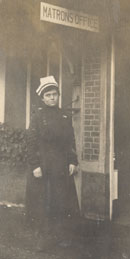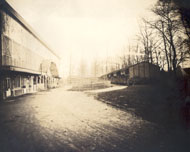In Her Words
Letter from Julia C. Stimson to her family, October 30, 1917
Rev. Henry A. Stimson, father of Base Hospital 21 chief nurse Julia C. Stimson, compiled his daughter’s letters to her family during the First World War into the book, Finding Themselves. Published in 1918 (before the end of the war), Finding Themselves tells of the experiences and gradual changes in the nurses as they “found themselves” through days and nights of unrelenting and difficult service.
In this letter Stimson relates the details of a typical day as chief nurse of a military hospital.
October 30, 1917
Dearest Dad and Mother —
It is quite a long time since I last wrote anything more than just short handwritten notes. It was the 14th that my last letter was dated, I find. Since that time we have been pretty hard at work. We had very little let-up at all for about six weeks. Our numbers have kept over the thousand mark all along, which means for us very little time for play.
I guess I will tell you about to-day, which was rather typical. It was bright and shiny when I went over to the Mess hall for breakfast. I can tell you it is good preparation for an Arctic exploration expedition to be living as we are. I sleep every night in woolen stockings and knitted bed socks, woolen pajamas, that lovely light blue sweater mother made for me, my Jaeger sleeping bag, which has two layers over and one under, and then three folds of blanket on top of all that, topped off by my heavy bathrobe, all this on me, the regular old hotbox that I always used to be. Well, after a nice warm night in all that, with a hot-water bag inside, it is not the nicest thing in the world to get up into an utterly unheated room. The water from my hot-water bag makes very comfortable bathing water (for all the bathing that I do then). But a few vigorous arm exercises start up my blood enough to make me fairly comfortable by the time I have on all my woollies. Over in the Mess hut there are two nice little coal stoves, which make the place very cheerful. There is a big coal stove in all our sleeping huts, but none of the heat from the one in my hut can get as far as my end room. I hope to get some kind of an oil stove that will heat things up a bit. I now have a little single-burner coal-oil lamp on which I can heat a small kettle of water, but it doesn’t do anything in the way of heating.
By the time we had finished breakfast (bread and butter, coffee, scrambled eggs, and marmalade this morning) it was pouring, so we all ran for our raincoats and hats, and then the six of us, Miss Taylor and I and the two day and two night supervisors, walked down to my office in the grand stand. There the batman had already started my tiny stove and a cheerful little heat was beginning to make itself felt. It takes about half an hour or more to read about the admissions, discharges, operations, the condition of all the “S.I.’s” (Seriously Ill) and “D.I.’s” (Dangerously Ill), and to hear that there did not seem to be enough blankets for the outgoing convoy, many of whom were stretcher patients, that there is difficulty about coal for some of the tents at night, about this or that nurse’s good work when so and so had such a terrific hemorrhage, and that an incoming convoy is just being unloaded, apparently very badly wounded cases, but no report on them as yet. Then the day supervisors go off to their lines to see about the new admissions, see if the head nurses have everything they need, tell this head nurse to send one of her assistants, who has such bad chilblains on her hands that she can’t do the surgical dressings that she has been doing, to report to a head nurse on one of the medical lines, where she won’t have to be doing quite so many wet things, etc. At nine Capt. Rainey, the acting head of the surgical side, comes for the written report that the Night Surgical Supervisor has made out for him of the most important cases. Then Major Fischel comes to ask about sick nurses. We had told one nurse, who had reported a sore throat, to be here at nine, and she was and was examined and advised. We had heard of another nurse who had lost her voice, so she was sent for. Miss Taylor got her figures of number of nurses on duty, number of yesterday’s operations, etc., ready and took that and our big Night Report to the C.O.’s office and came back to check up her list of the new S.I.’s and D.I.’s, to all of whose families it is her job to write a personal letter. One day she wrote as many as 25 of these letters. She had been out for “last hours” yesterday, so there were a number for her to add to her list. The official telegram is sent to all families, but it is one of the regular jobs of this office to do all the personal corresponding with families. Miss Taylor has learned to use a typewriter since she has been over here and can write very fast on it. She does not like to have the little secretary write these letters, for she often sends messages from the boys to their families and likes to do them all herself. I begin by writing my regular army form about nurses off duty. Then I made out several formal communications to the Colonel, about the need of a sink in the Nurses’ Mess, the need of a special new hut for sitting-room purposes for my 104 women. We now have just the 12 feet at the end of the Mess Hall which is quite inadequate. All the other hospitals in this vicinity have special sitting-rooms, and I am going to keep at the R.E.’s (Royal Engineers) until they give us one.
At 9:30 the nurses and V.A.D.’s begin to come up from the lines for Red Cross supplies, which are handled through this office and a little supply room we have next door. Pajamas, socks, mittens, old linen for handkerchiefs for the patients, oilcloth, treasure bags, writing paper, gramophone needles and records, razors, shaving soap, tobacco, record books, magazines, cologne for rubbing backs, chewing-gum, back rests, picture puzzles, cards, draughts, pipes, toasting forks, metal polish, brad boards, sweets, irrigator cans, etc. All these things are actually handled by us, not all the time, but some at one time and some at another. The British Red Cross sends us these supplies on our requisition every week. This morning we had very little to give out, for our supplies for this week had not come. We keep store only from 9:30 to 10:30, but this morning there were a number of other things than supplies that various nurses wanted to see me about. A V.A.D. wanted to see me about special leave to England because her aunt is dying. Another V.A.D., who knows better and should have reported at 9 a.m., came to tell us of another bad boil on her arm and had to be sent to the operating room and Capt. Rainey looked up. Several wanted to know if they could go to a special concert to be given in a neighboring camp to-night. The general invitation to all had come, but had not been posted, or these need not have asked for permission. Then it was time for the mail, which was huge this morning, and always has to be sorted in this office, because no one else knows just what to do with a number of letters each day that have to be specially looked after. This of course is just nurses’ mail. We still get a lot of mail for the English Sisters who were here before us. We often get many letters intended for other American Units. I have the lists of nurses of all of the Units that are with the B.E.F. and can readily send on straying letters. We have nurses away at C.C.S. [Casualty Clearing Stations] and some in the Contagious Hospital and we must see to their forwarding. The mail this morning took a long time. As soon as it is sorted it is sent up to the Mess, where the nurses will get it at lunch time. My own six or seven personal letters I could not look at till near one.
The Red Cross Supplies came along about 11:50 and had to be put away. Miss Taylor had gone down to the lines to see the supervisors, see how we needed to man the operating room for the afternoon, etc. Simone, the little secretary, had been helping all morning with supplies, letters, etc., and very quickly we got the things put away. Then a sergeant from the O.C.’s office came to ask about a missing package of “knickers” which should have arrived from London. He had found it and had that too dumped in my office. As it contained some instruments that I wanted right away, I wanted it unpacked here. Then Phil* came along to share some mail with us, but I told him he would have to come back later, for it was just time for the O.C. to come for this morning’s interview, so just as he and Ruth C., who had also dropped by to tell me about her wonderful birthday mail, cleared out, along came Major Murphy. There were several matters to take up with him, such as the possible removal of a bed or two from several too-crowded tents, the matter of the insufficient blankets, a little misunderstanding that some of our American boys had had with the British Y.M.C.A. people, about which the latter had come to see me yesterday afternoon. When the Major left, I had to see about some notices for the nurses that I wanted them to read at their lunch. Miss Taylor came back, Simone went off for her lunch, and we sat a moment or two and looked at the headlines of the two-sheet Daily Mail and Paris N.Y. Herald and read our home letters.
At one we went up in a pouring rain to our lunch. We had baked beans, cold bully beef, which is canned corned beef and hot half bad, lettuce salad, tea, bread and butter, and cheese, and stewed prunes. Miss Taylor was to be off from 1:30 to 4:30 to go down town to do some errands, so I came back to the office and started some accounts, writing of checks, etc. They were to have a big afternoon in the operating room, but all was working out smoothly. For the next two hours I worked steadily at my desk, acknowledging supplies, doing accounts, and writing business letters. Simone was doing all sorts of routine things for us on her typewriter. She is very useful and saves many steps as well as many minutes. Miss Taylor and I have been trying to be very punctilious about going off duty these days. She has been after me most severely, and the only way to keep her quiet is to do as she says, so off I go every day, alternating her.
* Julia Stimson’s younger brother Philip, a doctor, served in the Medical Corps. He was wounded by shrapnel in early September 1917. Julia Stimson arranged for her brother to be moved to Base Hospital 21 in Rouen for his treatment and convalescence.
Next letter from Julia Stimson to her family (Nov. 1, 1917)>>
Return to Letters & Memos (In Her Words)
Return to In Her Words
Back to Top


